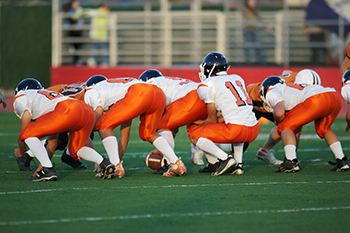
A condition known as turf toe involves the ligaments around the big toe. It is mainly caused by placing pressure on the flexed toe and pushing off of it with great force, thereby overstretching the ligament under the toe. This action results in pain, swelling, and a limited ability to move the toe. Turf toe is common to athletes such as football players, dancers, and gymnasts. A Grade 1, or mild injury involves minimal swelling and pain. A Grade 2, or moderate injury is caused by a partial tear or laceration of the ligament. A Grade 3, or severe injury, turf toe results in a complete rupture of the ligament. The treatment and recovery time depend on the severity of the injury. A mild injury may be treated with pain medication for a few weeks. A moderate injury may take up to a month to heal. With a severe injury, which may involve surgery, recovery may take up to 12 weeks. In addition, a brace, crutches, and special shoes may be required to wear. For more information on handling this type of injury, it is suggested that you make an appointment with a podiatrist.
Toe pain can disrupt your daily activities. If you have any concerns, contact Stephanie Tine, DPM of Flamingo Foot and Ankle. Our doctor can provide the care you need to keep you pain-free and on your feet.
What Causes Toe Pain?
Most severe toe pain is caused due to a sports injury, trauma from dropping something heavy on the toe, or bumping into something rigid. Other problems can develop over time for various reasons.
Toe pain can be caused by one or more ailments. The most common include:
- Trauma
- Sports injury
- Wearing shoes that are too tight
- Arthritis
- Gout
- Corns and calluses
- Hammertoe
- Bunions
- Blisters
- Ingrown toenails
- Sprains
- Fractures (broken bones)
- Dislocations
When to See a Podiatrist
- Severe pain
- Persistent pain that lasts more than a week
- Signs of infection
- Continued swelling
- Pain that prevents walking
Diagnosis
In many cases the cause of toe pain is obvious, but in others, a podiatrist may want to use more advanced methods to determine the problem. These can range from simple visual inspections and sensation tests to X-rays and MRI scans. Prior medical history, family medical history, and any recent physical traumatic events will all be taken into consideration for a proper diagnosis.
Treatment
Treatments for toe pain and injuries vary and may include shoe inserts, padding, taping, medicines, injections, and in some cases, surgery. If you believe that you have broken a toe, please see a podiatrist as soon as possible.
If you have any questions please feel free to contact our office located in Fort Lauderdale, FL . We offer the newest diagnostic tools and technology to treat your foot and ankle needs.